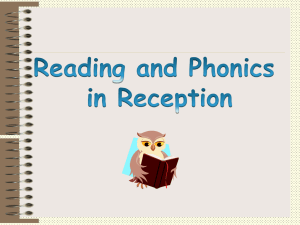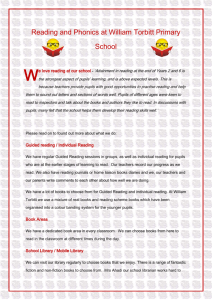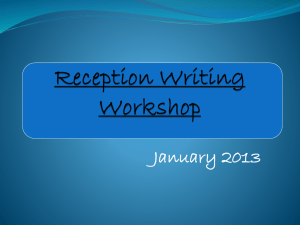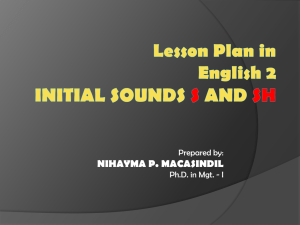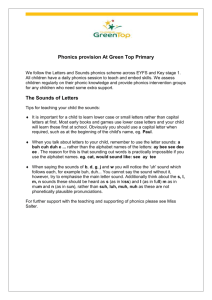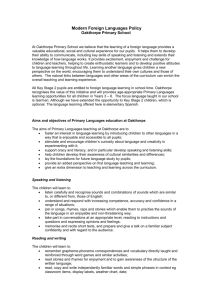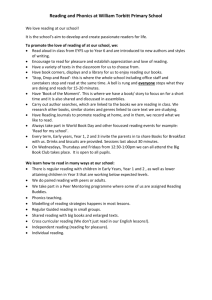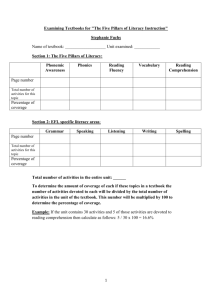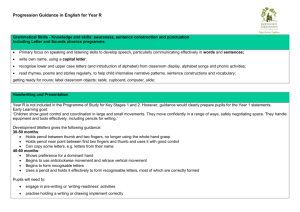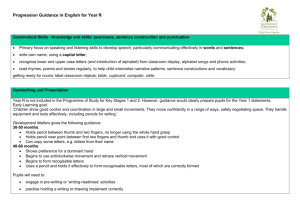Word Level - Turney School
advertisement
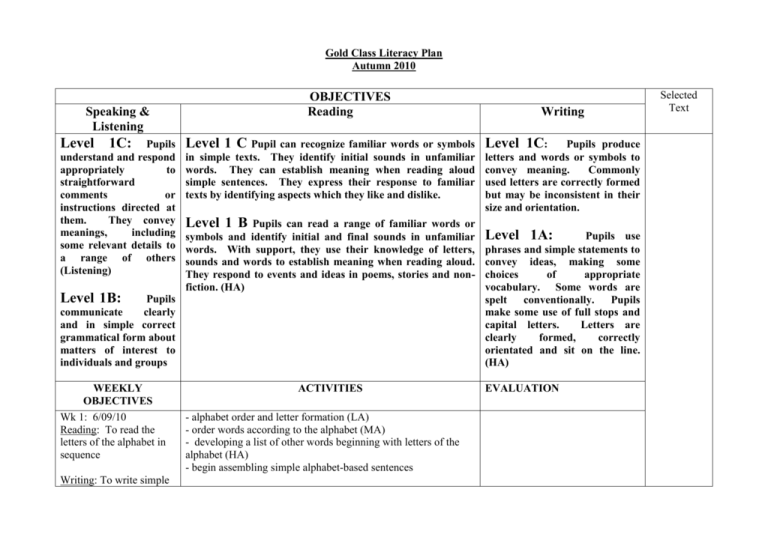
Gold Class Literacy Plan Autumn 2010 Speaking & Listening Level 1C: Pupils understand and respond appropriately to straightforward comments or instructions directed at them. They convey meanings, including some relevant details to a range of others (Listening) Level 1B: Pupils communicate clearly and in simple correct grammatical form about matters of interest to individuals and groups WEEKLY OBJECTIVES Wk 1: 6/09/10 Reading: To read the letters of the alphabet in sequence Writing: To write simple OBJECTIVES Reading Writing Level 1 C Pupil can recognize familiar words or symbols Level 1C: Pupils produce in simple texts. They identify initial sounds in unfamiliar letters and words or symbols to words. They can establish meaning when reading aloud convey meaning. Commonly simple sentences. They express their response to familiar used letters are correctly formed texts by identifying aspects which they like and dislike. but may be inconsistent in their size and orientation. Level 1 B Pupils can read a range of familiar words or Pupils use symbols and identify initial and final sounds in unfamiliar Level 1A: words. With support, they use their knowledge of letters, phrases and simple statements to sounds and words to establish meaning when reading aloud. convey ideas, making some They respond to events and ideas in poems, stories and non- choices of appropriate fiction. (HA) vocabulary. Some words are spelt conventionally. Pupils make some use of full stops and capital letters. Letters are clearly formed, correctly orientated and sit on the line. (HA) ACTIVITIES - alphabet order and letter formation (LA) - order words according to the alphabet (MA) - developing a list of other words beginning with letters of the alphabet (HA) - begin assembling simple alphabet-based sentences EVALUATION Selected Text words according to the letters of the alphabet Speaking/listening: To maintain attention and listen to the speaker in a small group activity. Wk 2: 13/09/10 Reading: To read HF words (ie- he v. she, they v. then) Writing: To write out HF words with emphasis on letter formation Speaking/listening: To listen and then repeat HF words Wk 3: 20/09/10 Reading: To read familiar words and attempt to phonetically read unfamiliar ones Writing: To write more descriptive sentences using a range of adjectives Speaking/listening: Wk 4: 27/09/10 Reading: To read simple verbs/nouns and attempt to phonetically read out http://www.playkidsgames.com/alphabetGames.htm http://www.playkidsgames.com/games/alphabetGame/default.htm - phonics work and word sounds booklets (every second day) - guided reading according to ability group (every second day) - verbalize HF words using flashcards and visuals - writing HF words (emphasis on letter formation for LA) - write simple sentences using HF words (HA) - put 3 word sentences in correct order according to colours (LA) - class spelling bee to sum up work with HD words - phonics work and word sounds booklets (every second day) - guided reading according to ability group (every second day) - generate a list of describing words (adjectives) as a group and then put them up for visual reference - generate a list of describing words (adverbs) as a group and then put them up for visual reference - read a story and identify the adjectives and adverbs (HA) - colour co-ordinate simple sentences with describing words in them (MA, LA) - phonics work and word sounds booklets (every second day) - guided reading according to ability group (every second day) - introduce the term “verb” and sing the “verb rap” - generate a list of action words as a group and then put them up for visual reference - mime actions for the class and have pupils guess what the action difficult or unfamiliar ones Writing: To fill in the blanks with appropriate nouns and verbs Speaking/listening: To actively listen to interactive story with specific attention to action words and nouns; respond to mimed actions of classmates Wk 5: 4/09/10 Reading: To read punctuated and unpunctuated sentences with the proper inflection is - introduce the term “noun” and identify the nouns in a story - sort photographs according to person, place, or thing http://kidsfront.com/words/action.html http://www.songsforteaching.com/earthtone/verbrap.htm - phonics work and word sounds booklets (every second day) - guided reading according to ability group (every second day) - overview of basic punctuation (full stop, comma, capital letter etc.) - read sentences without proper punctuation and have pupils fix them - write own self-narratives (ie- At the weekend, I will be…) using proper punctuation (HA) Writing: To write personal narratives with http://www.woodlandsparticular focus on firstjunior.kent.sch.uk/interactive/literacy2.htm#punctuation person narration and tense - phonics work and word sounds booklets (every second day) Speaking/listening: To - guided reading according to ability group (every second day) share personal narratives orally Wk 6: 11/09/10 - show “The Amazing World of Dictionaries” powerpoint slide Reading: To predict - predict the meaning of unfamiliar words based on context meaning based on - look up selected words in children’s dictionaries and generate a context; to scan and read class list of unfamiliar terms definitions found in dictionaries - phonics work and word sounds booklets (every second day) - guided reading according to ability group (every second day) Writing: To compile a list of difficult definitions Speaking/listening: To pronounce phonetically difficult dictionary words
